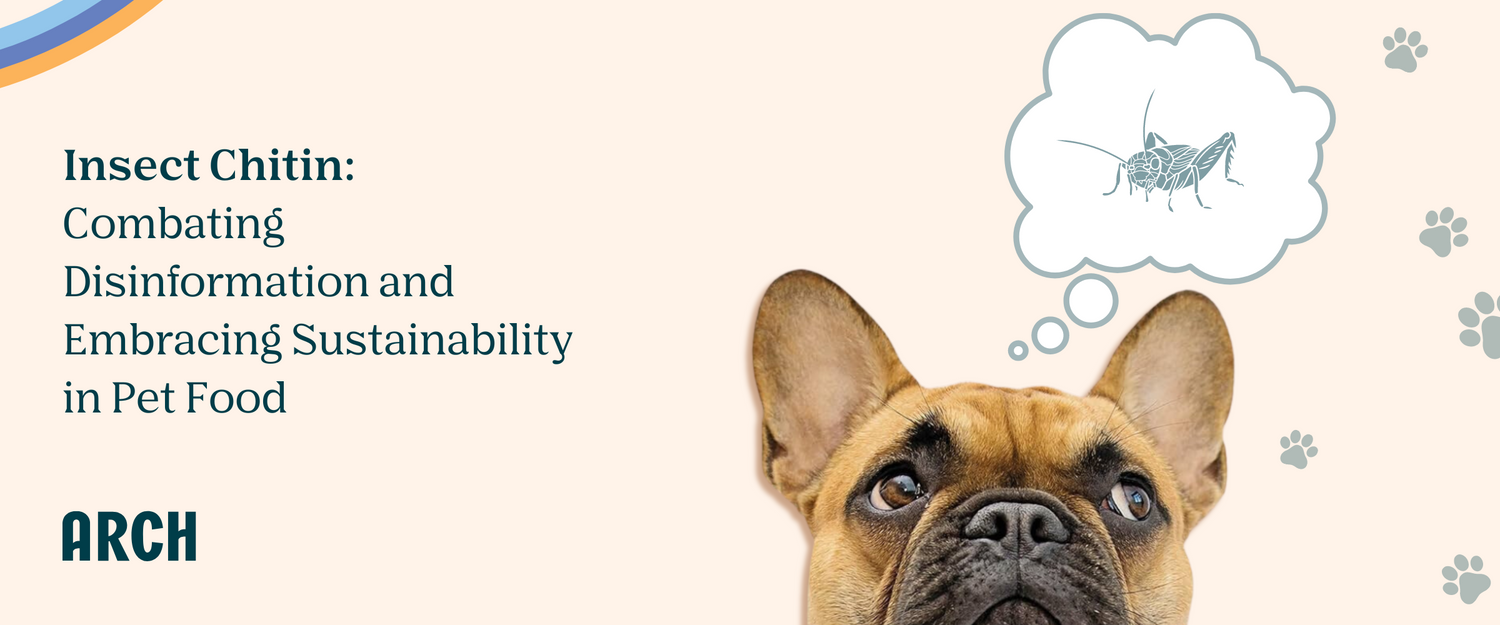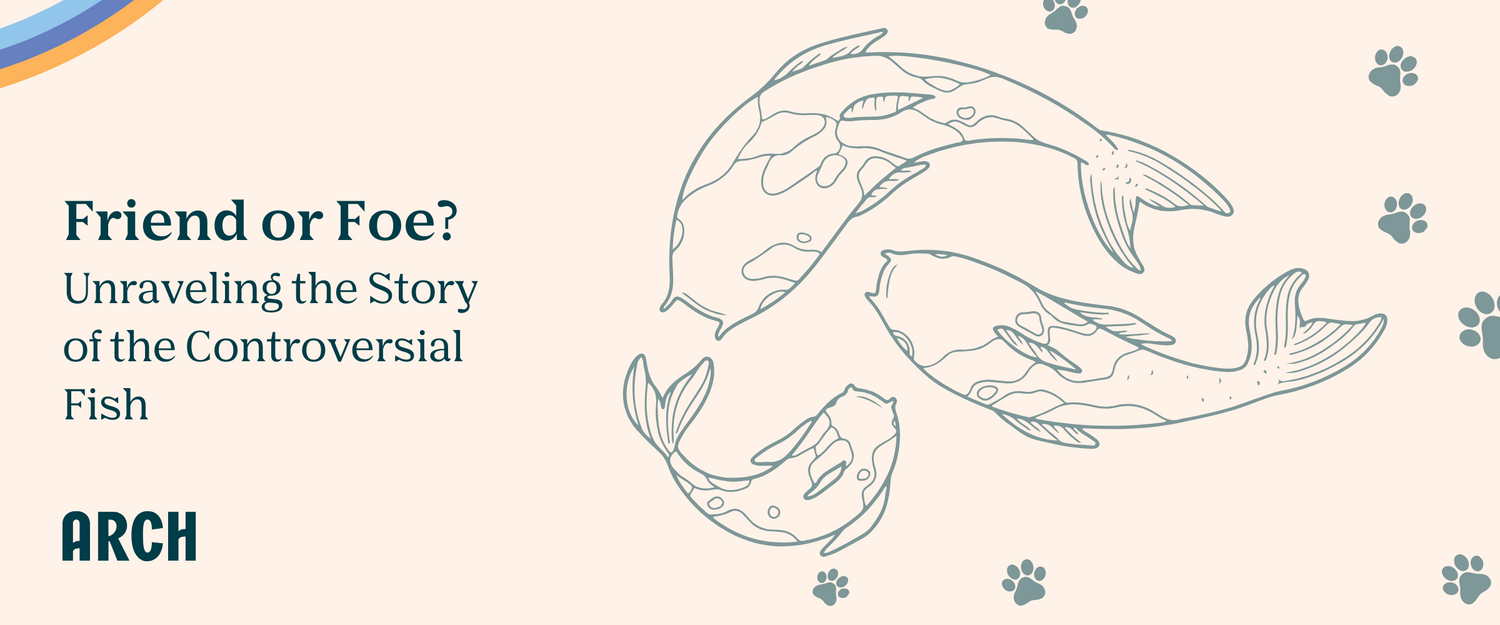A question we get in nearly every conversation with stores and potential customers is how did we come up with the idea of alternative proteins (like insects, algae, or invasive species) for pets. Here, we'd point you to a simple, founding premise: Arch was built to offer our pets nutritious, tummy-friendly treats and food without having to compromise the quality of the food or the health of the planet. From there, we poured over the available scientific studies on nutrition and sustainability to pick the best ingredients available.
Breaking our founding premise into three easy-to-digest values, pun intended, let's break down how alternative proteins helps us keep our promise to you as a stakeholder.
1. Quality Ingredients
To the surprise of few: the ingredients that make it into the majority of pet products are often of the lowest quality. On the topic of protein, we’ll spare you the details, but a quick Google search can provide some color on the origin of meat meal and the overall concern of rendering (the practice of creating a blend from various animal parts to make the “meal” and “by-product” you see on labels). Needless to say, the current supply of meat in the industry has been plagued by recalls, controversial ethics, and even fraud. In a particularly troubling example, a recent study found that 31% of “whitefish” pet food had substantial amounts of shark, inclusive of endangered species.
Our answer is to make treats and food with traceable, high-quality ingredients. No meat meals, no by-products, and no shark. But how good are alternative proteins for your dog really? Well, keep reading!
2. Nutritious and Tummy-Friendly
Thankfully, when it comes to nutrition, there are so many reasons to love alternative proteins like insect, yeast, and algae. All three of these proteins are incredible superfoods with unbelievable nutritional profiles that humans are enjoying more and more as they become available. Let’s use the example of cricket, the protein in our line of functional treats:
- Nutrient-dense: Cricket protein is a complete protein, meaning that it contains all nine essential amino acids. It’s also stacked with essential vitamins and minerals like b12, calcium, and iron. To place it against foods you know, cricket has more calcium than milk and 180% higher iron than beef! Best yet, crickets are also an excellent source of protein, with a protein content of around 65%, and more protein per gram than beef or chicken.
- Digestion: Crickets are a natural prebiotic (by virtue of the chitin found in their exoskeletons) and fantastic for tummies of pups both big and small. Relative to chicken and fish, crickets actually have higher digestibility, as found in this study.
- Food-sensitivity Friendly: Many pets are allergic to ingredients such as chicken, beef, dairy, soy, and nuts. Studies have found that over 1/3 dogs suffer from a sensitivity, with the most prevalent allergy being the meat itself. Accordingly, cricket protein is a great option for pets with food allergies or sensitivities, as it is far less likely to generate a reaction.
In short, it’s easy to see why this protein has been identified as the future-of-food for dogs, people, and even other animals, like chicken and pigs, without even having to discuss how incredible it is for the planet. But, we will anyway.
3. Planet-Friendly & Sustainability
To reduce the overall footprint of our product, there were a few low hanging fruits that are easy to implement: sustainable packaging, baked food/treats that do not require refrigeration, and keeping ingredients local whenever possible. These are table stakes for any new brand hoping to make an impact in consumables. Within the ingredient deck, there are a few alarming stats that made Arch consider alternative proteins from the get-go.
According to a study by UCLA, pets are responsible for 25 to 30% of the environmental impact of meat consumption in the United States. That means our pets are one of the largest contributors to livestock consumption in the world!
To highlight the impact of alt proteins, let’s get granular on a specific metric, the emission of the greenhouse gas, carbon dioxide (CO2):
- The CO2 equivalent from a vegetable protein (like pea) is responsible for the emission of 0.4 kg CO2eq. Now, let’s give you a relative value, comparing pea to beef.
- Beef is responsible for 35.0 kg CO2eq, almost 90 times more!
Some of the metrics on land use and water use are even more remarkable. Insect protein, like BSFL, emit relatively similar CO2 levels (0.439 kg), but use 3x less water than soy and 13x less land than say, coconut. Insects also gladly subside on compost, like fruit and veggie waste, to create a circular economy between these sustainable ingredients and our existing food supply chain.
Hopefully we've painted a picture on how sustainable these proteins can be: if not, feel free to read additional data points on their use of water, land, and energy!
Conclusion
So, if there’s a key takeaway from this post, it’s that we can do better both for our four-legged friends as well as future generations. Thanks to their superior quality, nutrition, and sustainability, we believe alternative proteins like BSFL, cricket, and spirulina are here to stay, in an industry in dire need of new solutions. If you found this interesting or impactful, we'd love if you tried some treats. Feel free to use the discount code: ALTPROTEIN for 15% off any order.
Thanks for reading and, as always, feel free to send us your comments and questions.
*We are appreciative for the studies conducted on alternative proteins that made this article fun and easy to write! We quoted six separate publications, but could have easily quoted another ten. There is a lot more research that can be done in the space, but every articles on the space is pointed in the right direction!**We also wanted to note that, with some degree of irony, products using “human-grade” meat instead of meat meals are some of the worst environmental offenders! Albeit pretty gross, meat meals find a use for many parts of the animal that would otherwise go to waste.






1 comment
Omg! Im so excited to have found you! VEGAN here, it pains me to give meat to my pups. Can we get any information about how to better feed a SAMOYED and a POM? Thx!